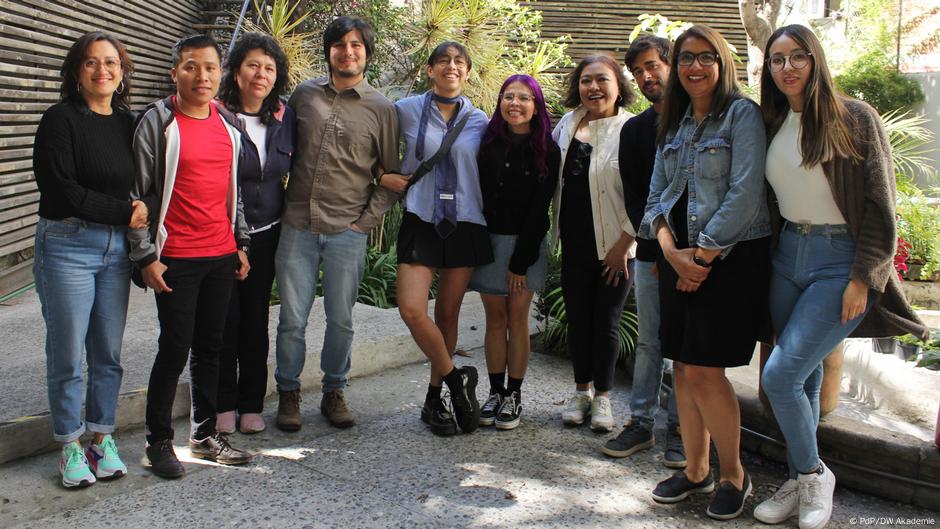Listen to the article
In Mexico’s battle against misinformation, local journalists are pioneering innovative approaches to rebuild public trust and promote media literacy. A new publication reveals how grassroots journalism is transforming communities across the country, offering valuable lessons for media outlets worldwide.
The Spanish-language publication “Narrar lo próximo: El poder del periodismo local en la era de la desinformación” (“Narrating the local: The power of local journalism in the age of disinformation”) examines six years of strategies developed by TERRITORIAL, a network of 17 independent Mexican media outlets. These organizations have successfully used local journalism to strengthen democracy and advance media and information literacy (MIL) in communities often overlooked by mainstream coverage.
The report comes at a critical time for Mexican media. According to the Reuters Institute’s Digital News Report 2024, more than 70% of Mexicans feel overwhelmed by information overload, while only 33% express trust in media organizations. This credibility crisis has created an urgent need for new journalistic approaches.
TERRITORIAL’s member organizations operate at local and hyperlocal levels, focusing on human rights, gender issues, and ethical reporting. Their coverage spans pressing societal concerns including disappearances, environmental crises, migration, and public health – often tackling subjects mainstream media neglect.
The publication, a joint effort by DW Akademie and the journalist network Periodistas de a Pie, highlights how these outlets have transformed themselves into what they call “MIL Media” – organizations committed to transparency, education, and accessibility. Their approaches empower audiences to critically evaluate information in an era of widespread misinformation.
Among the nine key lessons identified in the report is a fundamental shift in journalism’s relationship with audiences. Rather than delivering one-way information, TERRITORIAL outlets engage in ongoing dialogue with communities. For example, Raíchali, operating in the Sierra Tarahumara region, collaborates with indigenous communities to create stories that bridge understanding between rural and urban audiences.
Transparency has proven essential in rebuilding trust. POP Lab publishes the names and profiles of journalists alongside detailed explanations of their reporting processes, helping audiences understand not just what is reported but why and how it was covered.
The report also emphasizes that journalists must recognize their role as educators. Darwin Franco, a contributor to the publication, argues that rights-based reporting inherently educates audiences about social issues and civic engagement.
Local journalism’s transformative potential is evident in the work of outlets like La Verdad in Ciudad Juárez, which provides humanizing coverage of migration issues in a border region often subject to sensationalist reporting. By bringing context to divisive topics, these organizations help repair community relationships strained by polarization.
Financial sustainability remains challenging for independent media, particularly those committed to journalistic integrity. Several TERRITORIAL members reject government advertising – often used to influence editorial decisions in Mexico – and instead organize community events like bazaars and workshops to generate income while strengthening audience connections.
Perhaps most striking is how these outlets navigate dangerous reporting environments. Revista Espejo in Sinaloa covers the social impact of drug trafficking despite serious personal risks to its journalists, demonstrating that ethical reporting can serve as a form of resistance in contexts where powerful interests prefer silence.
Innovation among these outlets extends beyond technology to include experimental storytelling formats. TERRITORIAL members utilize podcasts, documentary theater, and illustration to connect with diverse audiences through approaches that resonate with local cultural contexts.
The publication, supported by Germany’s Federal Ministry for Economic Cooperation and Development, offers a roadmap for journalism that serves communities while promoting critical media literacy – an increasingly valuable model in an age of declining trust and information overload.
Fact Checker
Verify the accuracy of this article using The Disinformation Commission analysis and real-time sources.




11 Comments
This report on local journalism in Mexico offers a valuable case study on combating disinformation. Rebuilding public trust and promoting critical thinking around news sources are essential for maintaining a healthy information ecosystem.
This is an important issue that goes beyond Mexico. Empowering local journalism and media literacy is crucial for strengthening democracy worldwide in the digital age. I’m glad to see these innovative efforts highlighted.
Agreed. Identifying effective, community-driven solutions to combat disinformation could provide valuable lessons for media outlets globally.
The findings from this report on local journalism in Mexico highlight the importance of empowering community-level media to combat disinformation. Developing innovative approaches tailored to local contexts seems crucial.
It will be interesting to see if these Mexican media literacy initiatives can be replicated or adapted in other countries facing credibility crises in their news ecosystems.
Fascinating to see how local journalists in Mexico are leveraging media literacy to counter disinformation. Grassroots initiatives to build public trust and promote critical thinking around news sources are invaluable in the age of information overload.
I’m curious to learn more about the specific strategies and approaches these Mexican media outlets have developed. Rebuilding credibility in the face of information fatigue seems like a significant challenge.
While the scale of Mexico’s disinformation crisis is concerning, it’s encouraging to see local journalists taking proactive steps to address the problem. Grassroots initiatives to promote critical thinking around news sources are a step in the right direction.
I wonder what specific tactics these Mexican media outlets are using to rebuild public trust and advance media literacy. Their insights could be highly valuable for other communities facing similar challenges.
Kudos to the Mexican journalists and media outlets pioneering these grassroots strategies to strengthen democracy and media literacy. Their work demonstrates the power of local journalism to address complex societal challenges.
I’m curious to learn more about the specific challenges these Mexican media organizations have faced and how they’ve overcome them. Their lessons could benefit journalists worldwide.